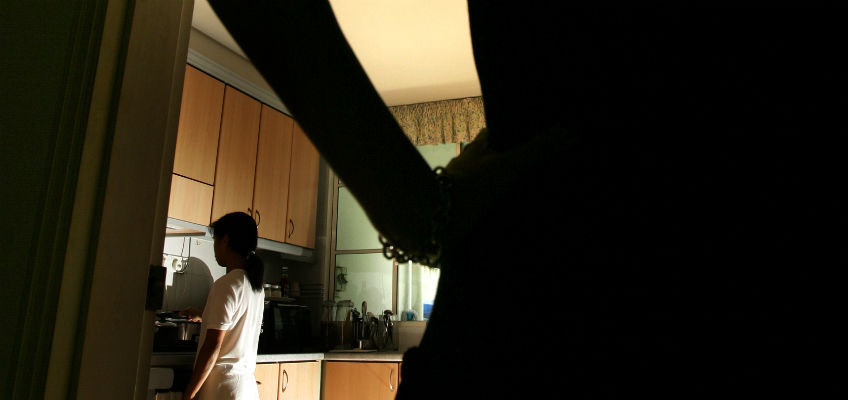He was unhappy that his Filipino domestic helper had opened the fridge and microwave at night.
So he grabbed his maid’s T-shirt, dragged her into a bedroom and, together with his wife, took turns to hit the 31-year-old maid on Jan 20 last year.
He slapped her face, and punched her stomach and chest, while his wife slapped the maid and grabbed her neck with both hands.
As the domestic worker lay on the ground in pain, unable to get up after the assault, her male employer stomped on her back.
The woman was sentenced to a week’s jail in January and her husband was jailed 14 weeks in February.
He appealed against the sentence, but this was dismissed last month by Chief Justice (CJ) Sundaresh Menon, who said the sentence could have been even higher.
The case comes at a time where more incidents of maid abuse are showing up.
The Straits Times reported last year that there were 26 maid abuse cases filed in the State Courts in 2014, nearly double the 14 filed in 2012. There were at least 10 reported cases last year.
And in just the first nine months this year, there were already nine cases.
More maids are also calling out for help over a range of issues, said Mr William Chew, executive director of the Foreign Domestic Worker Association for Social Support and Training (Fast).
Fast has been operating a 24-hour helpline for maids since June 2013.
In the first six months, there were fewer than 50 calls a month.
This has since shot up to about 180 calls per month, Mr Chew said.
Most phone in with general enquiries, and four out of 10 call to voice their loneliness and difficulties adjusting.
An actual abuse case only occurs out of every 100 calls, he said.
Owners of maid agencies whom The New Paper spoke to agreed that maid abuse cases must be met with justice.
Ms Shirley Ng, owner of Orange Employment Agency, said: “Maids are here working for a living, and such things should not be happening.”
Ms Ng, who has over 20 years’ experience, said most abuse cases happen due to a misunderstanding or a breakdown in communication between the employers and maids.
“Many of these cases happen because of a possible language barrier and they can’t communicate with their maid, or the maid doesn’t understand their unhappiness,” she said.
CHANGE
Mrs Winnie Wang of Advance Link International, who has been in the business since 1983, said maids today are very different from those who came here 10 or 20 years ago.
“Today, the girls have handphones and are more concerned about their own needs. Some of them become more distracted at work and aren’t used to hardship as those from the previous generations.
“So employers may think maids today aren’t performing up to standard and get angry with them,” she said.
Maids also find it tough to care for the growing elderly population, she said.
But Ms Ng also said abuse cases are still a minority.
“Today’s generation of maids are more educated, more knowledgeable. They know how to voice out their unhappiness or problems. “We may get more complaints, but that doesn’t mean more abuse cases,” she said.
Mr Chew said maid agencies should share the responsibility of ensuring better harmony in the household, while employers also need to manage expectations of their maids.
“The agencies need to understand the employers’ needs and background better, before assigning the right maid.
“Employers also have to manage their expectations that maids are not their slaves and they cannot possibly be expected to be able to do everything perfectly,” he said.
Ms Ng added: “We have to make the effort to understand our clients and our maids. If we assign an unsuitable maid just to force a sale, then it spells trouble.”
On the case described earlier, CJ Menon said: “Domestic helpers cannot become an outlet for a frustrated employer to vent his or her personal frustrations.
“They are human beings entitled to be accorded due dignity and respect because the human condition demands it.”
Employers should manage expectations
Talk to your maid, find out her problems and manage your expectations of her – that was the advice to employers given by maid agencies TNP spoke to.
Advance Link International founder Winner Wang said: “Communication is very important. Understand your maid, while at the same time, make your house rules clear to her.”
Employers should also manage their expectations of their maids, said Ms Shirley Ng of Orange Employment Agency.
“Even if the maid comes to you with 10 years’ experience, she needs time to settle in and learn the ways of your household. Give her time,” she said.
Ms Ng agreed, saying that being patient with your maid goes a long way towards building a good relationship.
Past cases
AUG 2016
A sales executive was jailed 14 months on Aug 25 for abusing her Myanmar maid.
Ang Lilian, 45, was convicted of 11 charges of abusing her maid after a 10-day trial in July.
The mother-of-two had used her fist and objects such as a dustpan, a shower head and a cane to hit Ms Moe Myint Aye, 28, whose employment was cut short as a result of Ang’s actions.
The attacks were targeted mainly at Ms Moe Myint Aye’s head and face.
Ang would also pull the victim’s hair, throw her to the ground and slap her repeatedly as well.
Ang, who was also ordered to pay compensation of $3,150 to the maid, is appealing.
MAY 2016
An elderly woman who kicked her maid in the head was sentenced to a week’s jail on May 23.
Myanmar domestic worker Nwe Ni Hlaing, 30, had worked for a few days before her employer decided to send her back to the maid agency.
Before she left for the agency on July 1, 2014, Ms Nwe went to her employer’s 64-year-old mother, who was here from China visiting her daughter, to apologise for any mistakes while working with her.
Ms Nwe Ni Hlaing knelt before the elderly woman, only for her to swing her knee upwards and hit the maid’s chin forcefully.
The maid suffered a swollen lip and shaky upper front tooth.
JUNE 2015
An employer who burned her domestic worker with a heated metal ladle twice and struck her with a metal grinding tool, causing her to bleed heavily, was jailed for 15 months on June 25.
The employer was also ordered to pay $4,900 in compensation to Myanmar national Naw Mu Den Paw.
She had used household items as weapons to cause hurt to her maid, who ran away from her Woodlands flat on Oct 3, 2013, after about three months of abuse.
District Judge Christopher Goh called the employer’s acts “cruel and inhumane”.

This article was first published on Sep 15, 2016.
Get The New Paper for more stories.




























